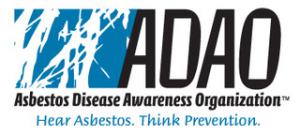ASBESTOS-FILLED SHIP SUNK BY BRAZIL HIGHLIGHTS IMPOSSIBLE TASK OF ASBESTOS RISK MANAGEMENT
LOS ANGELES, CALIFONIA, UNITED STATES, February 7, 2023 /EINPresswire.com/ -- The sinking of a decommissioned Brazilian ship, with an undetermined amount of asbestos, off the coast of Brazil highlights the impossible task of asbestos risk management said the Asbestos Disease Awareness Organization (ADAO), an independent nonprofit dedicated to preventing asbestos exposure through education, advocacy, and community initiatives.
“Asbestos, a known carcinogen, claims the lives of over 40,000 Americans annually, yet imports and use continue in the United States. Risk management of the lethal fiber is nearly impossible,” said Linda Reinstein president and co-founder of ADAO. “ Legacy asbestos is pervasive throughout our nation’s infrastructure — it is found in our homes, schools, workplaces and businesses. Clearly, these can’t all be sunk, which is why we need to finally ban asbestos imports and use and commit ourselves to addressing the problem of legacy asbestos so the unnecessary death toll from asbestos exposure doesn’t continue for decades longer,” she stated.
After being towed in circles for five months, the São Paulo, a 34,000-ton, clemenceau-class carrier loaded with asbestos, heavy metals and other toxic materials, was sunk into the Atlantic on the afternoon of Friday, Feb. 3, 2023.
Brazil has been a leading chrysotile asbestos miner and exporter for decades, though a recent Superior Court Justice Ruling halted asbestos mining, processing, and export in the country. The United States chlor-alkali industry was a large importer of Brazilian asbestos until this ruling.
Brazil’s Environment Minister, Marina Silva as well as a host of other environmental groups including, Greenpeace, Sea Shepherd and Basel Action Network, opposed the sinking of the carrier on grounds that it threatened marine life, presented a potential threat to public health, and violated several international treaties.
Inspectors were unable to get a clear estimate for the amount of asbestos aboard the vessel. Some compartments, due to accumulations of dangerous gas and other toxins, have been sealed off and were unsafe to open.
“The U.S. chlor-alkali industry’s continued imports and use of asbestos has created problems at home and abroad,” said Reinstein. “We have always called on lawmakers to look at the true cost of allowing the continued use of this dangerous and toxic substance, from the mine to the port to the plant and beyond. This is a stark reminder of the devastating long-term consequences of asbestos use. We can’t continue to allow this to continue when safer, economical options exist,” she finished.
###
ABOUT THE ASBESTOS DISEASE AWARENESS ORGANIZATION
Founded in 2004, the Asbestos Disease Awareness Organization (ADAO) is the largest independent 501(c)(3) nonprofit in the U.S. dedicated to preventing asbestos exposure to eliminate asbestos-related diseases through education, advocacy and community initiatives
“Asbestos, a known carcinogen, claims the lives of over 40,000 Americans annually, yet imports and use continue in the United States. Risk management of the lethal fiber is nearly impossible,” said Linda Reinstein president and co-founder of ADAO. “ Legacy asbestos is pervasive throughout our nation’s infrastructure — it is found in our homes, schools, workplaces and businesses. Clearly, these can’t all be sunk, which is why we need to finally ban asbestos imports and use and commit ourselves to addressing the problem of legacy asbestos so the unnecessary death toll from asbestos exposure doesn’t continue for decades longer,” she stated.
After being towed in circles for five months, the São Paulo, a 34,000-ton, clemenceau-class carrier loaded with asbestos, heavy metals and other toxic materials, was sunk into the Atlantic on the afternoon of Friday, Feb. 3, 2023.
Brazil has been a leading chrysotile asbestos miner and exporter for decades, though a recent Superior Court Justice Ruling halted asbestos mining, processing, and export in the country. The United States chlor-alkali industry was a large importer of Brazilian asbestos until this ruling.
Brazil’s Environment Minister, Marina Silva as well as a host of other environmental groups including, Greenpeace, Sea Shepherd and Basel Action Network, opposed the sinking of the carrier on grounds that it threatened marine life, presented a potential threat to public health, and violated several international treaties.
Inspectors were unable to get a clear estimate for the amount of asbestos aboard the vessel. Some compartments, due to accumulations of dangerous gas and other toxins, have been sealed off and were unsafe to open.
“The U.S. chlor-alkali industry’s continued imports and use of asbestos has created problems at home and abroad,” said Reinstein. “We have always called on lawmakers to look at the true cost of allowing the continued use of this dangerous and toxic substance, from the mine to the port to the plant and beyond. This is a stark reminder of the devastating long-term consequences of asbestos use. We can’t continue to allow this to continue when safer, economical options exist,” she finished.
###
ABOUT THE ASBESTOS DISEASE AWARENESS ORGANIZATION
Founded in 2004, the Asbestos Disease Awareness Organization (ADAO) is the largest independent 501(c)(3) nonprofit in the U.S. dedicated to preventing asbestos exposure to eliminate asbestos-related diseases through education, advocacy and community initiatives
Tracy Russo
Asbestos Disease Awareness Org
email us here
Visit us on social media:
Facebook
Twitter
YouTube
Legal Disclaimer:
EIN Presswire provides this news content "as is" without warranty of any kind. We do not accept any responsibility or liability for the accuracy, content, images, videos, licenses, completeness, legality, or reliability of the information contained in this article. If you have any complaints or copyright issues related to this article, kindly contact the author above.

